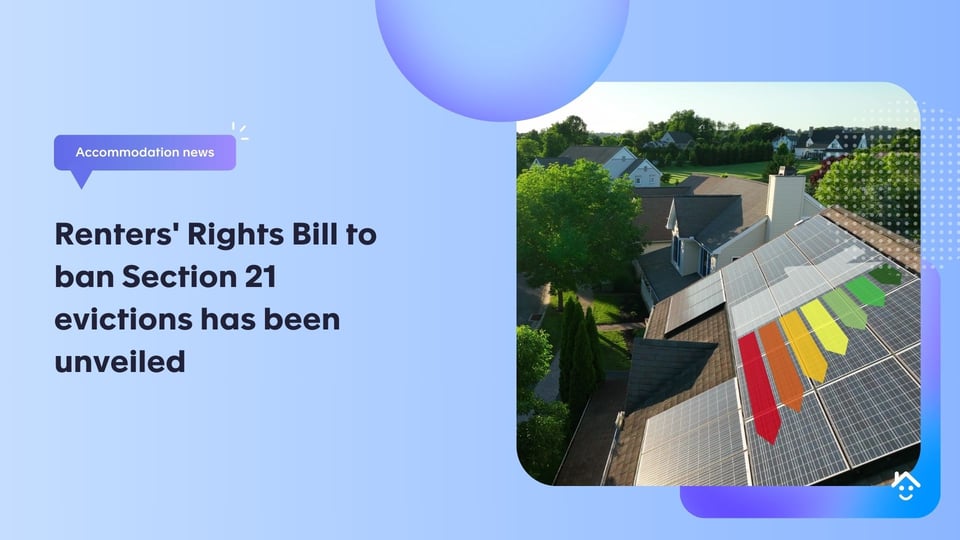The government's Renters' Rights Bill has started its journey through Parliament, aimed at providing greater security and protections for 11 million renters in England.
Key reforms include banning Section 21 'no-fault' evictions - for both new and existing tenancies - extending Awaab's Law into the private rented sector (PRS) and applying a Decent Homes Standard to all privately rented properties.
Fresh information about the impact on student landlords, including tenancies becoming periodic, can be found in our new article.
The government claims that Section 21 evictions have been a 'key driver of homelessness' with the ban being introduced when the Bill becomes law - not when the court backlog has been cleared.
'Threat of a retaliatory eviction'
Deputy Prime Minister, Angela Rayner said: "Renters have been let down for too long and too many are stuck in disgraceful conditions, powerless to act because of the threat of a retaliatory eviction hanging over them.
"Most landlords act in a responsible way but a small number of unscrupulous ones are tarnishing the reputation of the whole sector by making the most of the housing crisis and forcing tenants into bidding wars."
She adds: "There can be no more dither and delay. We must overhaul renting and rebalance the relationship between tenant and landlord.
"This Bill will do just that, and tenants can be reassured this Government will protect them."
Banning Section 21 evictions
In addition to banning Section 21 evictions, the Bill will introduce a Decent Homes Standard so all privately rented homes will be required to meet minimum standards of safety, health and decency.
Landlords who fail to comply could face fines of up to £7,000 from their local council.
Other measures included in the Bill include a ban on rental bidding wars, a ban on in-tenancy rent increases, and a ban on blanket bans on tenants with children or those in receipt of benefits.
There will also be a new Private Rented Sector Database 'to help landlords understand their obligations'.
Reform the private rented sector
Ben Beadle, the chief executive of the National Residential Landlords Association (NRLA), said: "Plans to reform the private rented sector have been on the table for over five years now.
"Above all, renters and landlords need certainty about what the future looks like. Whilst we await the precise details of the Bill, it is vital that it works, and is fair, to both tenants and landlords."
He added: "The end of Section 21, 'no explanation' repossessions represents the biggest change to the sector for over 30 years.
"Once the Bill is passed, it is vital that sufficient time is provided to enable the sector to properly prepare."
Mr Beadle warns that more than 4.5 million households will need tenancy agreements updating, and letting agents and landlords will need to undertake training.
Abolition of Section 21 evictions
Ben Twomey, the chief executive of Generation Rent, said: "The abolition of Section 21 evictions is painfully overdue and the requirement for landlords to provide a valid reason for eviction will give tenants more confidence to challenge disrepair and poor treatment by landlords and letting agents.
"Doubling notice periods for tenants when evicted will directly protect us from homelessness.
"However, renters risk being left with no financial support to find a new home in difficult circumstances and the government must take action to soften this blow."
He adds: "The Bill will ban scheduled unaffordable rent increases being written into contracts, but we remain vulnerable to backdoor rent-hike evictions."
Student landlords want to see the details
The managing director of Accommodation for Students, Simon Thompson, said: "Student landlords will be keenly waiting for the Bill's details to see what is in store for them.
"The Bill picks up from the Renters (Reform) Bill which was controversial before being ditched by the Conservatives – especially moving to periodic tenancies which would have been a major issue for student accommodation landlords.
"There's still a misunderstanding about what Section 21 eviction is - they are a quick route to possession without handing out blame or giving a reason."
He added: "But planning to make the ban law before resolving the court backlog is a recipe for disaster - with both landlords and tenants paying the price."




